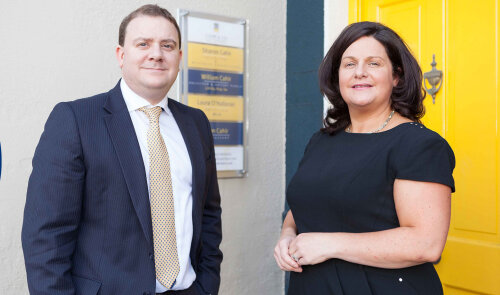Best Private Client Lawyers in Ennis
Share your needs with us, get contacted by law firms.
Free. Takes 2 min.
List of the best lawyers in Ennis, Ireland
About Private Client Law in Ennis, Ireland
Private client law covers legal services for individuals and families rather than businesses or the state. In Ennis, County Clare, private client work commonly includes wills and estate planning, probate and administration of estates, powers of attorney and capacity matters, trusts and wealth preservation, property transfers, inheritance disputes, and tax planning related to personal assets. Local solicitors in Ennis provide advice tailored to Irish law and to the practical needs of people living in County Clare and the surrounding communities.
Why You May Need a Lawyer
You may need a private client lawyer in situations where there are legal rights, obligations or risks that affect you or your family. Typical reasons include:
- Drafting or updating a will so your estate is distributed according to your wishes and to reduce the risk of family disputes.
- Applying for probate or letters of administration after a loved one dies, and managing estate administration tasks such as paying debts and distributing assets.
- Planning for incapacity by preparing a power of attorney or discussing options under the assisted decision-making framework.
- Advising on Capital Acquisitions Tax, Stamp Duty or other tax considerations related to gifts, inheritances or property transfers.
- Resolving disputes between family members about inheritance, wills or estate administration.
- Advising on succession for family businesses or transfers of property within families.
- Setting up trusts or charitable gifts as part of longer-term wealth or philanthropic planning.
Local Laws Overview
Key aspects of Irish law that commonly affect private client matters include the Succession Act 1965, the law on intestacy, and taxation rules for transfers on death or by gift. The Succession Act sets out how an estate is administered and the rights of spouses, children and dependants. If someone dies without a valid will, intestacy rules determine who inherits.
Capital Acquisitions Tax - commonly called CAT - applies to gifts and inheritances and is payable to the Revenue Commissioners. Tax thresholds and allowances change from time to time, so it is important to check current figures when planning or reporting a gift or inheritance.
Property transfers and ownership are governed by land registration systems - the Land Registry and the Registry of Deeds - and conveyancing is subject to rules set out in statute and case law. The Land and Conveyancing Law Reform Act and related legislation updated many aspects of property law in recent decades.
Powers of attorney and capacity issues are increasingly important. The Assisted Decision-Making framework introduced by legislation addresses how decisions are made for people who lack capacity - legal arrangements include enduring powers of attorney and court-based protections. The rules governing how to apply for probate and how the Probate Office issues grants are also central to estate administration.
Frequently Asked Questions
What is the difference between a will and dying intestate?
A will is a legal document in which you name beneficiaries, an executor and set out how your assets should be distributed after your death. Dying intestate means you did not leave a valid will. If you die intestate, your estate is distributed according to statutory intestacy rules, which may not reflect your wishes and can cause disputes among relatives.
Who can make a valid will in Ireland?
To make a valid will you must be at least 18 years old and have the necessary testamentary capacity - that means understanding the nature and effects of making a will, knowing the extent of your property and appreciating who might expect to benefit. The will must be in writing, signed by you and witnessed by two competent adults who are present together when you sign.
What should I do immediately after a loved one dies?
Notify close family and the deceased person's general practitioner or coroner as required. Locate any will and speak with the named executor or a solicitor. If there is a solicitor holding the original will, they often handle probate applications. Gather essential documents such as the death certificate, the will, bank details, property deeds, life insurance policies and a list of assets and liabilities. Consult a solicitor early if the estate looks complex or contentious.
How do I apply for probate or grant of administration?
An executor named in a will applies for a grant of probate from the Probate Office. If there is no will, an interested person applies for letters of administration. The application requires an inventory of assets and liabilities and completion of Revenue returns for tax where applicable. A solicitor can prepare and lodge the application and help with the estate administration process.
What is Capital Acquisitions Tax and when is it payable?
Capital Acquisitions Tax - CAT - is the tax on gifts and inheritances in Ireland. CAT is charged at a flat rate on the value of a gift or inheritance above the relevant tax-free threshold. The tax-free thresholds depend on your relationship to the disponer. Tax rules and thresholds change, so you should confirm current rates and allowances and consider getting tax advice early in estate planning or before accepting a gift or inheritance.
What is a power of attorney and when should I consider one?
A power of attorney is a legal document by which you appoint one or more people to make decisions on your behalf about financial matters and property. An enduring power of attorney can remain in effect if you lose capacity. You should consider a power of attorney if you want to plan for possible future incapacity, to allow trusted family members to manage affairs in case of illness, or to appoint someone to deal with transactions while you are abroad.
What happens if someone lacks capacity and there is no power of attorney?
If someone loses capacity without an enduring power of attorney, their family may need to apply to the court or to the appropriate guardianship or decision-making body for authority to manage the person’s property and affairs. The exact procedures depend on the legal framework in force at the time and the complexity of the affairs. A solicitor experienced in capacity and elder law can advise on options and the likely process.
Can a will be challenged and on what grounds?
Yes, a will can be contested. Common grounds for challenge include lack of testamentary capacity, undue influence, improper execution, or that the will was procured by fraud. In addition, certain persons may seek provision or further provision from an estate under the Succession Act if they were dependent on the deceased and were not adequately provided for in the will. Will contests can be complex and often require legal representation.
How much does private client legal work cost in Ennis?
Costs vary by solicitor and the nature of the work. Some matters are straightforward and handled on a fixed-fee basis - for example, preparing a simple will - while others are scaled hourly or by a percentage of the estate for administration work. Estates with contested issues, complex tax planning or international elements will usually be more expensive. Always ask for a written estimate or costs agreement before instructing a solicitor.
How do I choose the right private client lawyer in Ennis?
Look for a solicitor who specialises in private client work and who has relevant experience with wills, probate, tax and capacity matters. Check professional qualifications and membership of recognised bodies. Ask about their fee structure, the likely timetable, and who in the firm will handle your matter. Local knowledge of County Clare and familiarity with regional practices can be helpful. Arrange an initial meeting to assess whether you feel comfortable with their approach and communication style.
Additional Resources
Citizens Information - for plain-English summaries of laws on wills, probate, powers of attorney, inheritance and social supports.
Revenue Commissioners - for official information on Capital Acquisitions Tax, stamp duty and related tax obligations.
Law Society of Ireland - for guidance on finding a solicitor, professional standards and complaint procedures.
Probate Office - the office responsible for grants of probate and letters of administration in Ireland.
Property Registration Authority - for information about land registration, title searches and property records.
Local solicitors and firms in Ennis - for practical, face-to-face advice tailored to your family and local property matters.
Legal Aid Board - information on whether you may be eligible for civil legal aid or assistance for certain types of matters.
Citizens Information Centres and local advocacy groups - for community-level supports and information on elder care and capacity services.
Next Steps
1. Gather essential documents - death certificate if relevant, wills, title deeds, bank statements, pension details, life assurance policies, details of loans and any correspondence about assets or liabilities.
2. Make a short list of matters you need help with - drafting a will, applying for probate, tax advice, arranging a power of attorney, or resolving a dispute.
3. Contact a specialist private client solicitor in Ennis for an initial consultation. Ask for a written fee estimate, a likely timetable and who will be your main contact.
4. Prepare for the first meeting by listing questions, bringing key documents and noting important dates or family details that could affect succession or entitlement.
5. If cost is a concern, ask about phased work, fixed-fee options and whether any aspects can be handled administratively at lower cost. Check whether you qualify for legal aid for specific matters.
6. Keep records of all steps taken and any legal documents signed. Store the original will and powers of attorney in a safe place and tell trusted family members or your solicitor where those documents are kept.
7. If there is immediate risk of assets being lost or disputes escalating, seek urgent legal advice to protect property, bank accounts or important documents.
Getting proper legal advice early reduces uncertainty, manages tax and administrative obligations efficiently, and helps protect family relationships. A local private client solicitor in Ennis can guide you through each step and ensure compliance with Irish law.
Lawzana helps you find the best lawyers and law firms in Ennis through a curated and pre-screened list of qualified legal professionals. Our platform offers rankings and detailed profiles of attorneys and law firms, allowing you to compare based on practice areas, including Private Client, experience, and client feedback.
Each profile includes a description of the firm's areas of practice, client reviews, team members and partners, year of establishment, spoken languages, office locations, contact information, social media presence, and any published articles or resources. Most firms on our platform speak English and are experienced in both local and international legal matters.
Get a quote from top-rated law firms in Ennis, Ireland — quickly, securely, and without unnecessary hassle.
Disclaimer:
The information provided on this page is for general informational purposes only and does not constitute legal advice. While we strive to ensure the accuracy and relevance of the content, legal information may change over time, and interpretations of the law can vary. You should always consult with a qualified legal professional for advice specific to your situation.
We disclaim all liability for actions taken or not taken based on the content of this page. If you believe any information is incorrect or outdated, please contact us, and we will review and update it where appropriate.
Browse private client law firms by service in Ennis, Ireland
Ennis, Ireland Attorneys in related practice areas.










